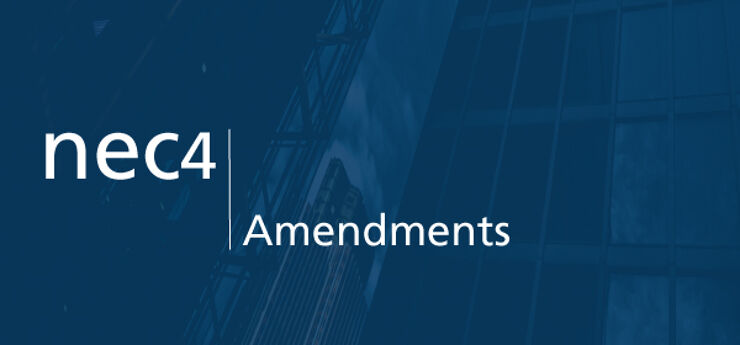
The NEC4 suite of contracts was published in June 2017. Following its publication, there has been continuing discussion and feedback from users and industry experts on the new features, forms and changes which were introduced. This feedback has been extremely positive overall and has provided many constructive suggestions as to how the contracts could be further enhanced.
To build on the constructive feedback and further improve the contracts, NEC published a set of amendments in January 2019 and October 2020 and have now issued a further set of amendments in January 2023. The principal amendments are detailed below. In addition, there are some minor corrections to the wording in some of the contracts.
A schedule of amendments is available for each contract on the NEC website. The schedules detail all amendments being made except minor typographical amends which do not affect the interpretation or application of the contracts. Copies of the contracts published from January 2023 will contain the amendments and a table summarising them. Updated versions of the User Guides have also been produced to reflect the amendments made to the contracts.
NEC will also be hosting a webinar to discuss the latest amendments and changes made to NEC Contracts on 19 April at 11.30. Click here to sign up.
Secondary Option X29 (all main contracts)
NEC published X29 climate change as a standalone secondary Option in July 2022 and this has now been incorporated into each relevant main contract. It is designed to help NEC users in their drive towards achieving net zero greenhouse gas emissions and other related climate change and biodiversity targets. The Option enables users to state their climate change requirements in the Scope and provides a new climate change plan for suppliers to set out their strategy for achieving the requirements. X29 also introduces the possibility of using a performance table, in those contracts that do not already contain one, enabling users to set financial incentives to encourage suppliers to achieve the stated performance targets. The overall aim is to help all parties reduce the impact of the works, service or supply on climate change.
- X29 Climate Change - ALC
- X29 Climate Change - DBOC
- X29 Climate Change - ECC
- X29 Climate Change - ECS
- X29 Climate Change - FMC
- X29 Climate Change - FMS
- X29 Climate Change - PSC
- X29 Climate Change - PSS
- X29 Climate Change - SC
- X29 Climate Change - TSC
- X29 Climate Change - TSS
Working from home and other locations outside of the Working Areas / Service Areas (ALC, DBOC, ECC, ESC, FMC, FMS, TSC and TSS)
Amendments have been made to the Schedule of Cost Components (SCC) and the Short Schedule of Cost Components (SSCC) to address the issue of people working from home or other locations outside of the Working Areas / Service Areas. In the SCC there is now an option for users to identify in the Contract Data people whose costs can be recovered as part of Defined Cost even if they are not normally based within the Working Areas / Service Areas and are working outside of the Working Areas / Service Areas. This would include people working from home for example. The SSCC has been amended to allow the cost of people who would normally be based in the Working Areas / Service Areas to be recovered as part of Defined Cost when they are not working within the Working Areas / Service Areas as long as they are working on the contract. The distinction between directly and indirectly employed staff has also been removed in respect of working location.
- Schedule of Cost Components - ALC
- Schedule of Cost Components - DBOC
- Schedule of Cost Components - ECC
- Schedule of Cost Components - ECS
- Schedule of Cost Components - FMC
- Schedule of Cost Components - FMS
- Schedule of Cost Components - TSC
- Schedule of Cost Components - TSS
Using the supplier’s design (ALC, DBOC, ECC, ESC, FMC, FMS and SC)
The ability of the Client to use the suppliers design has been clarified and extended to include documents prepared for design. This change has also been made in the relevant subcontracts.
Adjudication (all contracts featuring Y(UK)2)
Dispute resolution Option W2 has been amended to clarify that the Adjudicator decides the procedure and timetable for the adjudication, in keeping with the requirements of the Housing Grants, Construction and Regeneration Act (1996).
Secondary Option X22 – Early Contractor involvement (ECC)
Secondary Option X22 has been amended to provide further flexibility in the development of a project in Stage One and to provide greater clarity over the process to follow if the works do not proceed to Stage Two. The Project Manager and Contractor can agree a change to the Site Information during Stage One and if the works do proceed to Stage Two those compensation events originally judged against the Contract Date are instead judged against the date of the notice to proceed to Stage Two. This allow information gathered in Stage One and considered in the Stage Two proposals, such as any updated Site Information, to be taken into account in assessing compensation events. In addition any compensation events that occurred before the issue of the notice to proceed to Stage Two are deemed to be included in the changes made to the Prices, Completion Date and Key Dates in the notice to proceed to Stage Two. This allows the Parties to address all outstanding compensation events as part of the notice to proceed to Stage Two, removing the need for them to dealt with individually.
If the works do not proceed to Stage Two the Project Manager has to issue a notice to this effect and changes the Completion Date and the Prices to match those at the end of Stage One, confirming that delay damages and an assessment of the Contractor’s share should not apply to Stage One. The revised clause also confirms that no incentive payment will be due if the works do not proceed to Stage Two. The amount due on termination has also been clarified to only apply to the works in Stage One if the works do not proceed to Stage Two.
Contactor’s liability for design limited to reasonable skill and care (ECSC and ECSS)
In the ECSC an Option has been introduced into the Contract Data to allow the Client to reduce the Contractor’s obligation for any design they produce to reasonable skill and care as opposed to the default position under the contract of being liable for any failure. Linked to this is the requirement for the Contractor to provide professional indemnity insurance and a compensation event to address a situation where a Contractor corrects a Defect for which is not liable as it exercised reasonable skill and care. This provision reflects the reluctance in certain jurisdictions for suppliers to accept liability for design other than on a reasonable skill and care basis. A similar provision is also included in the ECSS.
The PSSC has also been updated to include a compensation event to address a situation where the Consultant corrects a Defect for which is not liable as it exercised reasonable skill and care.
Limit of liability (ECSC, ECSS, FMSC, FMSS, SSC, TSSC and TSSS)
A clause has been included to allow a total limit on liability to be included in the Contract Data / Subcontract Data. This brings the short contracts into line with the main contracts with the inclusion of a limit on liability being optional.
Damage to the Client’s property (FMSC, FMSS)
The FMSC has been amended to clarify that the Service Provider is liable for loss or damage to the Client’s property which arises from the Service Provider Providing the Service and to include the ability for the Client to limit this liability if they wish to do so in the Contract Data. A similar provision is also included in the FMSS.
Payment on termination (SSC)
The SSC has been brought into line with the other contracts in respect of payment due to the Supplier in the case of a termination due to a Purchaser’s default or for the Purchaser’s convenience.
Upcoming Webinar
NEC will be hosting a webinar on the 19 April which will provide an explanation of the changes to the contracts. Discussions will cover why some of these changes were made and how best to implement them. There will also be an opportunity to ask questions. Click here for more information.
Read the details of the specific X22, X29 and Schedule of Cost Components amendments



